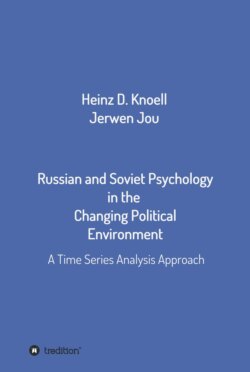Читать книгу Russian and Soviet Psychology in the Changing Political Environment - Heinz-Dieter Knöll - Страница 7
На сайте Литреса книга снята с продажи.
ОглавлениеPreface
This monograph describes psychology in changing political environments in Tsarist Russia in the mid of 19th century, the Soviet Union, and the Russian Federation until the year 2000. Russia and the Soviet Union are of special interest, because of the multitude of political changes. There were not only the so-called October-Revolution in 1917, which initiated the Soviet rule, and the breakdown of the Soviet Union in 1990. But there were also a multitude of changes in Soviet times. In the beginning of the Soviet rule there were many new developments in sciences, which also affected psychology. Since Stalin assumed power, there were many developments and ideological restrictions as well. These are well documented in books and journal articles (e.g. Artemyeva, 2015; Bauer, 1959; Ehrsam, 1985; Graham, 1972; Kozulin, 1984; Krementsov, 1997; Kussmann, 1974; McLeish, 1975; Petrovsky, 2000; Thielen, 1984).
At first glance it may seem that after Stalin’s death there was a stable ideology, which guided the sciences and research. This was not the case, as we document in our monograph using a qualitative Time Series Analysis.
We present the decisions made by the Soviet Union’s Communist Party congresses and Central Committee meetings concerning the task goals of psychological research in different sub-fields of psychology (e.g. Human Experimental Psychology, Social Psychology, Personality Psychology). We relate the political conditions of a given period to the percentage of pages of psychological papers published in different areas of psychology in Voprosy Psichologii (“Questions of Psychology”), the only Russian psychology journal prior to 1977. The nature and types of the papers reflected the vicissitudes of Soviet and Russian psychology during the latter half of the 20th century when it emerged from pedagogy in 1955, as it became a sub-field of pedagogy by a decree of the Communist Party in 1937 (London, 1949; Petrovsky, 2000).
In the following sections, we give a short sketch of the Russian and Soviet Psychology schools of thought, a history of the Russian Empire, the Soviet Union, and the Russian Federation and their impact on psychology. Then we explain our research method, it’s limitations and how to read the graphical representations of our results.
In the next chapter we investigate the Communist Party’s role in the development of the Soviet Union’s and Russian Federation’s psychology from 1955 to 2000. We present our findings of the party’s influence on psychology in the post-Stalin era, based on our bibliometric research using the qualitative Time Series Analysis method. Finally, we draw some conclusions and provide an outline of our future research.
This research was aided by the support of many individuals. We especially thank the following persons:
Svetlana Yu. Zhdanova, Chair of Developmental Psychology, Department of Psychology, State University, Perm, Russia, provided us with the tables of content of Russian and Soviet psychological journals, which were the data basis for our research.
Olaf Morgenroth, Professor of Psychology, Faculty of Psychology, Medical School Hamburg, Germany, who is engaged in the History of Psychology, was the mentor and coach of our research.
Jonas Knöll, Researcher, Friedrich-Löffler-Institute, Celle, Germany gave us initial support in writing the R-scripts for the statistical evaluation and representation of our data.
Lydia Lange, Max-Planck-Institute for Educational Research, Berlin, Germany supported us with her expertise in bibliometric research.
Madlen Schmaltz, Institute of Information Systems, Leuphana University, Lüneburg, Germany was our reliable office assistant.
The Team of Interlibrary Loans, Media and Information Center, Leuphana University, Lüneburg, Germany provided us with the piles of literature we needed for the interpretation of our data.
Arlene Veldkamp and Nataliia Kumorkievich did the final proofreading. Thank you so much!
There have been much more persons, who supported our work and encouraged us to go on, who are not mentioned here. We thank them also very much.
